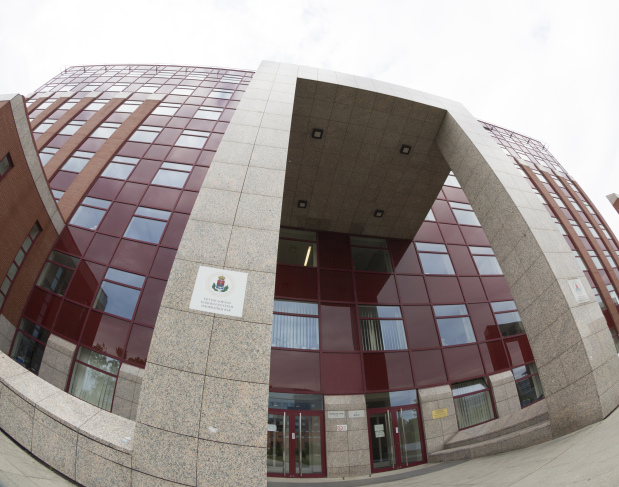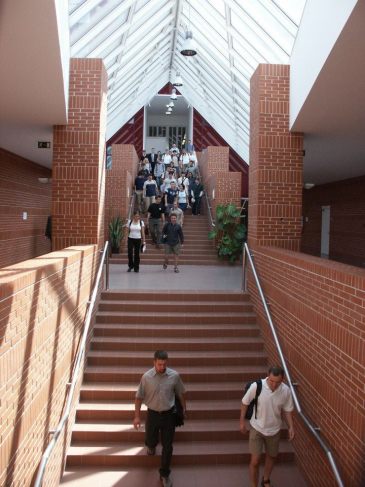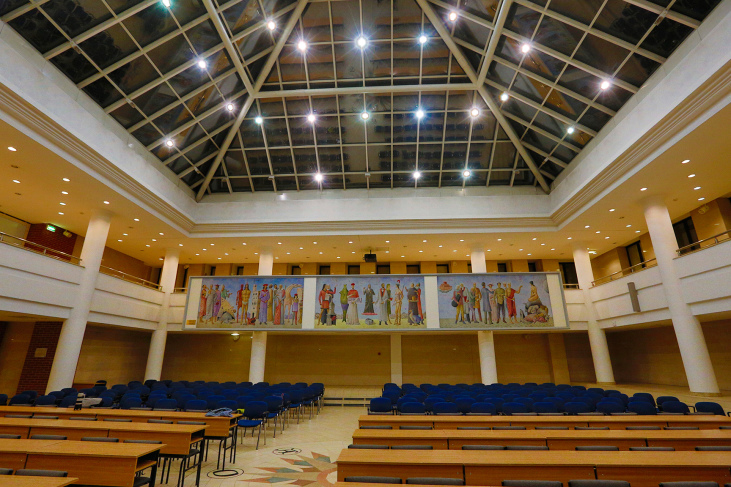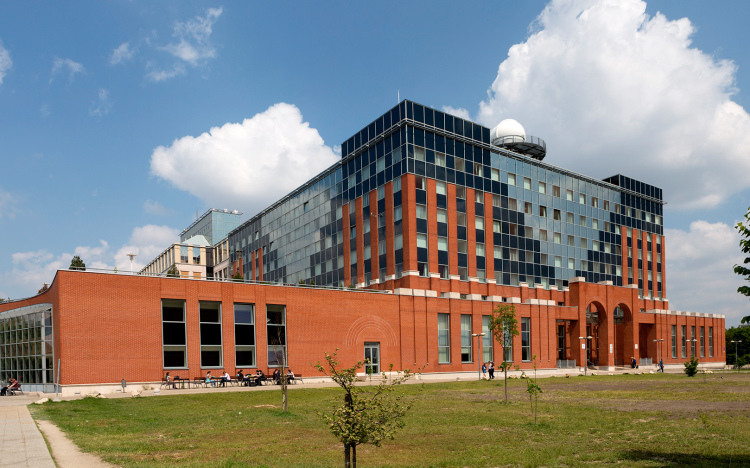Survey Statistics and Data Analytics MSc
Survey Statistics and Data Analytics MSc
Survey Statistician and Data Analyst
Degree program
Master
MSZKSUR
English
4 semesters (2 years)
120
10
25
The data revolution is creating a need for data analytics in a wide variety of fields. We have developed our programme in response to this need. Our goal is to train data analysts who can contribute to data-driven decision making in business/industry, public administration, or social research.
Our students will be able to analyse large databases, be familiar with statistical solutions for survey-based research, and conduct online research and web analytics in scientific, governmental, and business applications. They will have knowledge of network analysis, natural language processing, be familiar with the basics of machine learning, be prepared to implement analytic solutions in R and Python and know the basics of data analysis infrastructure (SQL, Git, and other tools). We will also provide the mathematical foundation that is essential for a deep understanding of methods and for lifelong learning.
The programme also provides students with practical knowledge that introduces them to the entire process of data analytics (project management, data collection, data visualization, business communication). The programme is recommended for applicants seeking a complex programme that is flexible while providing a solid foundation in data analytics.
More information: https://tatk.elte.hu/en/studies/surveydatamsc
Tracks/Specializations:
There are no specializations, but students can tailor their learning path to their own interests as the electives are organized into the following modules of two to three courses: Biomedical Research, Economic Research, Digital Data Analytics, Social Research, Business Research.
The programme has been running successfully in Hungarian for 30 years and is one of the most popular master's programmes at ELTE. Its founder is Tamás Rudas, Professor at the Department of Statistics at the University of Washington, former Director General of the Center for Social Science Research of the Hungarian Academy of Sciences, Fellow of the European Academy of Sociology, former President of the European Association of Methodology.
The success of the programme is based on continuous improvement and adaptation to changing social contexts. The ideal data analyst has three main skills: statistical, programming, and business/social research skills. Accordingly, we provide strong mathematical/statistical/machine learning skills to extract new insights from the data. Programming skills are also provided for effective data management. Business/social research knowledge is provided to understand the context of the data.
In addition, we try to develop the creativity needed to ask good questions, select good data, and find good interpretations. Our strength is that, beyond the technical side of analytics, we also aim to provide the business context so that our students can independently translate research questions into analytical problems and then translate the results back to the client.
Modular programme structure
Current version is here. Course descriptions are available here.
The program is divided into 5 mandatory blocks:
- Mathematical foundation (mathematical foundation, linear algebra, probability theory, mathematical statistics)
- Data collection (data collection methods and sampling, survey data processing)
- Basics of business research (market research, communication and project management, project practice)
- Programming (R, Python, Github, SQL)
- Data analysis (multivariate probability theory and statistics, data science, data analysis)
- Applications (qualitative research, social studies, network analysis)
Elective professional modules
In addition to the mandatory modules, we also offer differentiated professional modules with elective courses:
- Biomedical Research
- Economic Research
- Digital Data Analytics
- Social Research
- Business Research
The program has the advantage of adapting to the complex needs of the labor market. Our graduates can design research based on either questionnaire, digital or administrative data sources. We want to provide our students with the opportunity to develop a learning path and career path that suits their own interests, whether they want to use applications of data analytics based on artificial intelligence or quantitative tools of market research.
Our program includes a six-week internship, and we have decades of experience working with renowned business figures. This, combined with the knowledge gained in the program, enables our graduates to choose from a wide range of job opportunities. They are typically employed in data-intensive sectors: public administration, info-communication, financial services, market and public opinion research, marketing, non-profit sector, healthcare and pharmaceuticals. At the same time, many of our graduates are working in research institutions or in higher education, as the program also prepares them for doctoral studies, potentially in all the disciplines covered by the program (applied mathematics, statistics, social sciences, computer science).
- Data Scientist
- Business Intelligence Analyst
- Survey Statistician
- Healthcare Analyst
- Data Analyst
see further LinkedIn "survey statistics" search term results , many of them about our graduates
1550 EUR
3500 EUR
EUR 50 (non-refundable) between 01/10/2024-15/11/2024________________ EUR 100 (non-refundable) between 20/11/2024-30/04/2025________________ EUR 180 (non-refundable) between 05/05/2024-31/05/2025
EUR 50 (non-refundable) between 01/10/2024-15/11/2024________________ EUR 100 (non-refundable) between 20/11/2024-30/04/2025________________ EUR 180 (non-refundable) between 05/05/2024-31/05/2025
3500 EUR
EUR 50 (non-refundable) between 01/10/2024-15/11/2024________________ EUR 100 (non-refundable) between 20/11/2024-30/04/2025________________ EUR 180 (non-refundable) between 05/05/2024-31/05/2025
YES
01, Sep, 2025
31, May, 2025
No
Entry requirements
Applicants must have a BA/BBA degree in any of the following fields: Social Studies, Sociology, Applied Economics, Economic and Financial Mathematical Analysis, Commerce and Marketing.
In the case of other bachelor’s degrees: individual consideration.
If the BA degree does not meet all the necessary requirements, the applicant may be required to complete additional credits in the relevant fields during their first year of study to fulfil these requirements upon acceptance.
Language requirements:
Certification of English knowledge (both written and oral): B2
• IELTS Score: 5.5
• TOEFL iBT Band: 46-59
• Cambridge English Scale Score: 162
If the applicant is unable to prove their knowledge of English with any of the above certifications, their English knowledge will be assessed during the admission interview. Any letter of acceptance issued by the Faculty of Social Sciences is based on the verified fact that the applicant’s command of English has been assessed; therefore, they are considered eligible to pursue their studies at the institution.
If the applicant can prove that they completed their former education entirely in English by submitting a notarized attestation and a detailed academic transcript, no proof of language knowledge will be required throughout the admission process.
| Document | Comment |
| Online application form | |
| Bachelor-level degree | |
| Transcript of records | |
| Motivation letter | The general guidelines and expectations for the letter are: the applicants introducing themselves, their motivation, interests and goals with the programme. The length of the motivation letter is between 1500 and 4000 characters |
| Copy of the main pages of the passport (needs to be valid) | needs to be valid |
| Copy of application fee transfer | |
| Language certificate () | if the applicant has one |
The application starts in the online application system. Students need to register in the system, fill in the online application form, upload the required documents and follow the instructions during the application process.
Students who hold Hungarian citizenship and/or dual citizenship, must apply through felvi.hu Please note that if an application is submitted not according to the aforementioned, it will be rejected.
Procedure of the entrance examination
The application deadline refers to the final submission of the complete application package through the online application system.
For the September intake, there are three application periods:
- Early Bird Period: October 1, 2024, to November 15, 2024, 23:59 (CET)
- Regular Period: November 20, 2024, to April 30, 2025, 23:59 (CET)
- Last Call Period: May 5, 2025, to May 31, 2025, 23:59 (CET)
These distinct periods allow applicants the flexibility to submit their applications at their convenience. All applicants within each period have an equal chance of gaining admission to the programme.
After each application deadline, the Admission Board reviews the applications. After the admission interview, applicants are informed of the selection outcome through the online application system within approximately one month after the admission interview. Admission letters will be sent out through the online application system until the end of June. For February intake and Early Bird applications, admission letters will be sent out through the online application system until the end of December.
Applicants with a full application package will be notified after the application deadline about the exact time and date of application interviews conducted via Ms Teams. Applicants are responsible for having technically suitable conditions for the interview from their side
Applicants are expected to be prepared taking questions regarding the compulsory admission materials (see: Recommended readings for the entrance exam) from the side of admission committee composed of a professor, a lecturer and a student representative.
Based on the results, certain students may be placed on a waiting list. Final results are expected by the first half of August.
Type of entrance examination: Oral
Place of entrance examination: Online
Further details of the entrance exam:
During the exam, applicants will have a discussion on one of the topics listed below. The topics are based on Freedman, D. - Pisani, R. - Purves, R.: Statistics, 4th edition. W. W. Norton & Company, 2007 (or later edition). After each topic the corresponding parts of the Freedman et al. book are listed.
- Experiments and observational studies (Freedman Part I.)
- Probability: independence, product rule, addition rule, conditional probability (Freedman Part IV.)
- Statistical inference: point estimate, confidence interval, why inference is useful, what has an effect on the confidence interval (Freedman Part V. and VII.)
- Null hypothesis significance testing: why is it useful, null- and alternative hypothesis, significance level, one- and two-sided tests (Freedman Part VIII.)
- Z-test, t-test: when are these applied, what is the difference between one- and two-sample (independent samples) tests (Freedman Part VIII.)
- Chi-square tests: when are these used, what are the assumptions (Freedman Part VIII.)
- Correlation: what is it used for, what are the assumptions, how to use it (Freedman Part III.)
- Regression: what is it used for, what are the assumptions, how to use it (Freedman Part III.)
- Reliability and validity: what do these mean, what factors influence these (Freedman Part I. and VI.)
- Sampling: simple random sampling, stratified sampling, two-stage sampling, sampling design and validity, why use two-stage sampling, what is representativity (Freedman Part VI.)
Further details of selection and evaluation:
Applicants with a full application package will be asked to participate in an oral entrance exam. The institutional admission scores are based on a total evaluation of academic excellence (based on the submitted documents) and the results of the entrance exam. The entrance exam seeks to assess the general and professional knowledge and interest of the applicant.
A successful oral entrance exam is the prerequisite of getting admitted. If the applicant fails the oral entrance exam, the application will be rejected.
Professor
Ms Judit SZABÓ
Departmental Coordinator
E-mail: statisztika@tatk.elte.hu
TEL: 0036 1 372-2500/ 6828(ext)
International Office, Faculty of Social Sciences
TEL: +36-1-372-2500/6779
E-mail: international@tatk.elte.hu
Postal address:, Pázmány Péter sétány 1/A, Budapest, H-1117
More information
Faculty Website
Facebook page of the Faculty of Social Sciences
Faculty of Social Sciences
Faculty of Social Sciences
Eötvös Loránd University (ELTE) offers more than 60 degree programs in foreign languages in the fields of Education and Psychology, Humanities, Informatics, Law, Social Sciences and Science. Currently, about 2400 international students study at ELTE and the community of international students is growing from year to year. Check out what our international students think and discover the wide-range of opportunities waiting for you at ELTE. Join the growing international community of ELTE.
Eötvös Loránd University (ELTE) offers more than 60 degree programs in foreign languages in the fields of Education and Psychology, Humanities, Informatics, Law, Social Sciences and Science. Currently, about 2400 international students study at ELTE and the community of international students is growing from year to year. Check out what our international students think and discover the wide-range of opportunities waiting for you at ELTE. Join the growing international community of ELTE.
0
/
0


















0
/
0













